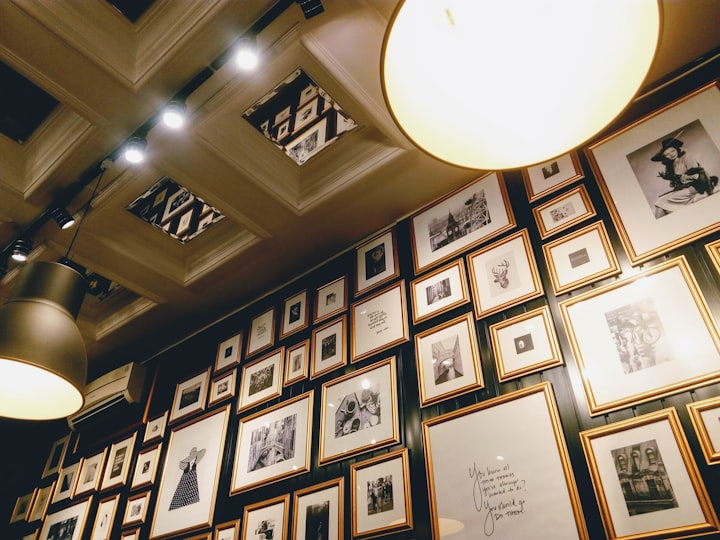
"If walls could talk," I heard the writer whisper under her breath as she began typing. She sat in a corner booth next to a tinted window. Rain poured softly outside, tapping against the windowpane.
The window doesn't like the rain. The poets and the writers seem to like the rain, making love to it with their words or raging against it.
The window's constantly screech on about how they wish someone would put a canopy above their pane as the French cafes have.
I watch as all the writer's hands move swiftly across the keys or scratch with their pens on the paper. The quiet tapping and scratching lull me to sleep. The building creeks a little as I drift off.
When I open my eyes, I see that the afternoon rush has filled the coffee house with thirsty businesspeople. I fidget a little expanding my beams as the heat and the cold ebb and flow through the stone. I saw a beatnik once many years ago staring at me from a corner booth and heard him say to a lady friend that he thought the building could breathe. He wasn't wrong.
I love rainy days. The spring, winter, and fall draw the attention of writers, artists, and musicians, filling the tables in the mornings and evenings with the brilliant minds of creators. They don't seem to like the heat in the summer. They all retreat to wine country. I overheard a couple of publicists say to the barista thirty years ago, some guys named Huvane and Halls.
I've memorized the faces of famous patrons framed and hanging on my fellow walls. Their black and white, shadowed eyes smile and smolder back at me. Isabel Allende, Margaret Atwood, Virginia Woolf, Jonathan Franzen, Ian McEwan, David Mitchell, Toni Morrison, Haruki Murakami, Philip Roth, Zadie Smith, John Updike, and so many more.
I can only read what patrons read when they sit close to my stone skin. People smile at the pictures on me or flip one off with a finger. I saw some of their faces in years past, beautiful faces with sadness, cynicism, or humor in their eyes as they glanced at me. I am also ornamented with pictures, but I can't see the faces adorning my shell.
I understand more than people know. Like trees, though I wasn’t grown, I was made. I came from the earth just like everything else, crafted and manipulated by the hands of people, not unlike the writer’s crafting worlds with the tip and scratch of the pen or keyboard. I was crafted to create a corner of an invented world where people come to find peace, warmth, and comfort. Without me, they would just have a cup of coffee.
People's lives unfold before me every day. I know what I am, who I am. It's nice to feel important. Children lean against me and cry while they wait for their parents to get their coffee. I'm happy to be helpful to them, and I always hope their parent will get them a cake pop from the barista, often visible in the display case by the register.
I enjoy watching the baristas come and go over the years. I know them better than anybody. I've seen them young, fall in love, marry and leave. At least, that's how it was in the early days.
The first year I woke up here, I saw the date on a newspaper left discarded at a table, nineteen thirty-one. The words Prohibition spread across the top. I don't know what that is, but I'm sure it had something to do with the secret door in the back room.
Beautiful ladies in shimmering dresses with tassels dangling at their knees, glittering hats with feathers, and handsome gentlemen in suits, top hats, and bowler caps would come and go as they pleased. They seemed happy, and I wished I could hear what the walls by that door were talking about, but they were too far away. They seemed quite animated, and the neighboring walls would share the bits and pieces of the most interesting conversation, stories about card games and bubbling drinks that shimmered like gold and silver liquid, frothing and foaming at the tops of glass ladled pints. Card games and spinning tables entertained the patrons. I could hear the distant rhythm of jazz and blues, sultry voices singing from the back room.
I wished I could have been that wall in those days.
The most recent date I read showed two thousand nineteen, just before the doors locked and closed for what felt like an eternity. The words Covid-19 splayed across the page with eerie images of a spikey kind of creature that I could only assume was a type of bug. I hoped it wouldn't get inside and crawl on me or the other walls.
The cafe was quiet for months. The sound of cars drifting by and people talking or shouting on the street lulled me into a dreamless, restless sleep. The creaking and breathing of the other walls distracted me as I tried to remember better days.
The nineteen forties were a solemn time. People liked to come and sit and talk, hug and cry. There was a celebration in September nineteen forty-five about a war being won. Walls don't like wars. It worried us, and we hated the mention of bombs. So we were happy too when it came to an end.
I enjoyed the fifties the most. The cafe got new flooring with black and white checkers. The radio on the counter was replaced with something called a Jukebox and played a new kind of music with upbeat singers.
I missed the stories the radio on the counter used to share, stories of mystery and murder. We would listen intently, and then we would discuss what we heard to pass the time and the night away. Sometimes a patron would look up from their book and coffee and look around confused as though they'd heard something, shrug it off, and continue reading their book. Our communings sounded like low voices most people couldn't hear, much like the whisperings of trees.
I liked the smell of cigars and cigarettes until the sixties and seventies. The people started smoking something else that I'd only smelled a little of in the thirties. They smoked it more, something called marijuana. It reminded me of my days in the woods, surrounded by lush green plants. It's an earthy smell but mustier. The smoke mingled with the fresh and stale coffee scents of the cafe. The sweet lemon and coffee cakes couldn't phase it out. Neither could the saccharine smell of vanilla, ginger, nutmeg, and clove aromas of autumn blends.
New sounds emerged as people called hippies sat on the sidewalks playing their guitars and lutes, like satyrs in nature, barefoot and carefree. Large groups of them were invited in by the barista then, they made picket signs and talked boisterously about another war and got angry whenever someone mentioned anything about a word called politics or presidents. We didn't like them. They often talked about tearing down walls.
The clothing got more colorful when the eighties came, and so did we. A stereo was installed, replacing the jukebox, and video cameras appeared. Music played from morning til night, loud, timbrel music. The windows hated that music. Sometimes, it would make them shake until the barista turned it down.
I'm glad I'm not a window. They get broken sometimes and have to be replaced. The newer windows don't understand the things that we talk about. Strange people break them at night and make a mess, trying to tear open the register or break into the vault in the back room. I don't like those kinds of people. In the winter, it gets cold, causing the moisture in my wood beams to expand even more until someone comes and repairs it.
One night, during the nineties, a sound I'd hoped never to hear woke me up. It woke us all up. Shouting, screaming, and the sound of thousands of feet marching in the streets. Gunshots and more shouting followed. Something tore through the windows, and a bottle, with a rag in it, burst into flames catching the tables and floor on fire. A police car drove through the other window, and an angry man stumbled out of the driver's side seat, abandoning the car. No patrons were here, at least, and the barista had never come in that morning. One of us was destroyed, reduced to splinters and rubble. It happened so fast that we didn't know what hit us. It felt like a war. We knew from the thirties, the sixties, and seventies that it was a riot.
After that, it felt good to get repaired. We worried that we'd be torn down, but we were fixed up better than ever. A new owner refurbished everything, restoring the cafe as a modern tribute with eclectic colors and designs, dim, relaxing lighting, and new appliances and fixtures. The coffee and food smelled better too. The writers and poets came back.
The barista returned bright and cheerful when the people had the Covid-19 bug problem under control. She fired up the expresso maker, turned the lights back on, and the music soft and slow. The cafe felt warm and cheerful again. The magic returned as the creators drifted in and out, cozying up in their booths and chairs next to me, keeping the warmth in while they would read and write.
Couples would meet for the first time on first dates, married couples seeking a few moments of time on their lunch breaks. The police officers and firefighters stopping in for a pick me up always said thank you to the barista when she offered them a free cup of coffee.
Today, I enjoyed reading over the shoulder of a writer typing a story about me on her keyboard. A story I've been whispering to her for the past few days every time she comes in to enjoy a hot cup of cocoa. She doesn't drink coffee. I heard her tell the barista that it doesn't make her feel well, so she prepared a special hazelnut hot chocolate for her every day. Hot chocolate isn't on the menu but can be made upon request. Not many people can hear me, but this one can. I got lucky, so many of us walls wish we could share our stories, and so few can.
I don't know what will happen tomorrow or the next day, but I do know that I love this cafe, it's my home, and these people are my family.
The End.
About the Creator
Amy Black
I am an American contemporary poet and author specializing in speculative YA, adult fiction and children's stories.
https://www.facebook.com/amyblackfiction






Comments (1)
So good. I loved your take on the challenge. I really thought it was excellent the way you used the wall to walk the reader through so many historical events. Nice one.